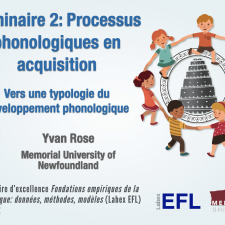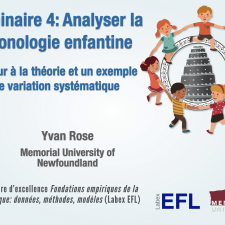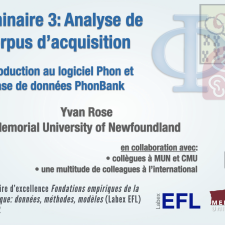Notice
Yvan Rose I - Phonétique et phonologie de la parole enfantine: questions fondamentales, débats théoriques, et hypothèse de travail
- document 1 document 2 document 3
- niveau 1 niveau 2 niveau 3
Descriptif
Ce premier séminaire jettera les bases du cours progressif, qui s’articulera autour de questions théoriques et empiriques concernent la nature des représentations phonologiques, leur origine, ainsi que leur expression dans le parler enfantin.
D’un point de vue émergentiste, on peut émettre l’hypothèse que les traits phonologiques sont acquis à partir de dimensions particulières du signal acoustique de la langue ambiante (p.ex. les indices acoustiques pertinents aux lieux et modes d’articulation; Rose 2014, à partir de Pierrehumbert 2003). Cependant, ces modèles n’expliquent que très vaguement les mécanismes permettant à l’apprenant de lier ces dimensions acoustiques à leur réalisation articulatoire dans la langue parlée. Nous explorerons ce sujet à l’aide de l’hypothèse centrale du modèle A-map (McAllister Byun et al. 2016), qui suggère des mécanismes d’association entre signaux acoustiques et leurs corrélats articulatoires pertinents à tout apprenant tant en langue première qu’en langue seconde. Ce modèle s’applique aussi à l’observation plus générale que tout système phonétique individuel ne cesse d’évoluer au cours de la vie du locuteur. Lecture suggérée: McAllister Byun, T., S. Inkelas & Y. Rose. 2016. The A-map Model: Articulatory Reliability in Child-specific Phonology. Language 92(1). 141–178.
Intervention / Responsable scientifique
Thème
Dans la même collection
-
Yvan Rose II - Survol des faits d’acquisition phonétique et phonologique et implications théoriques
RoseYvanCe deuxième séminaire débutera par un survol des données de corpus en acquisition de la phonologie, avec une emphase sur les productions linguistiques d’apprenants francophones (p.ex. France; Québec)
-
An embodied and situated perspective on speech and language - Labex EFL - Lecture 3 and 4: Speech a…
In this lecture, I will provide evidence from multimodal experiments in which we investigated the effect of rhythmic motions with the legs or hands on respiratory parameters, and the temporal
-
An embodied and situated perspective on speech and language- Labex EFL - Lecture 2: The forgotten a…
FuchsSusanneIn this lecture, I will talk about respiration, a biological rhythm which is flexible and adaptable and crucially involved in speech production, perception and face-to-face interactions. Based on
-
An embodied and situated perspective on speech and language- Labex EFL - Lecture 1: Changes and cha…
FuchsSusanneOver the last century, our understanding of variability in the speech signal has undergone a variety of changes. Once regarded as noise in the signal, it has now become a major topic of investigation
-
Embodying Speech - Lecture 4 - Emergence in Embodied Speech : Sound Change, Ontogeny and Phylogeny …
GickBryanWhile any theory of speech behavior must ultimately incorporate the human body, modeling bodies has not been a central program in language research. Thinking about the body in quite tangible terms was
-
Embodying Speech - Lecture 3 - Coarticulation, Superposition, Representation (Bryan Gick 2019)
GickBryanWhile any theory of speech behavior must ultimately incorporate the human body, modeling bodies has not been a central program in language research. Thinking about the body in quite tangible terms was
-
Embodying Speech - Lecture 2 - The Parts of Speech II : Quantality and Speech Movements (Bryan Gick…
GickBryanWhile any theory of speech behavior must ultimately incorporate the human body, modeling bodies has not been a central program in language research. Thinking about the body in quite tangible terms was
-
Embodying Speech - Lecture 1 - The Parts of Speech I : Dimensionality and Modularization (Bryan Gic…
GickBryanWhile any theory of speech behavior must ultimately incorporate the human body, modeling bodies has not been a central program in language research. Thinking about the body in quite tangible terms was
-
Listening to Speech - 2 (John Kingston 2012)
KingstonJohnListening to Speech - 2 (John Kingston 2012)
-
Listening to Speech - 3 (John Kingston 2012)
KingstonJohnListening to Speech - 3 (John Kingston 2012)
-
-
Listening to Speech - 4 (John Kingston 2012)
KingstonJohnListening to Speech - 4 (John Kingston 2012)
Avec les mêmes intervenants et intervenantes
-
Yvan Rose IV - Retour sur les questions théoriques et perspectives
RoseYvanCe dernier séminaire permettra de rassembler les thèmes, données et méthodes explorés dans les semaines précédentes et d’en considérer les implications au niveau théorique, tant pour les modèles de
-
Yvan Rose III - Analyse de corpus et introduction au logiciel Phon
RoseYvanCe troisième séminaire sera un atelier pratique sur ordinateur dédié à l’analyse de corpus à l’aide du logiciel Phon (https://www.phon.ca), lequel permet d’intégrer analyses phonologiques (à partir de
-
Yvan Rose II - Survol des faits d’acquisition phonétique et phonologique et implications théoriques
RoseYvanCe deuxième séminaire débutera par un survol des données de corpus en acquisition de la phonologie, avec une emphase sur les productions linguistiques d’apprenants francophones (p.ex. France; Québec)
















